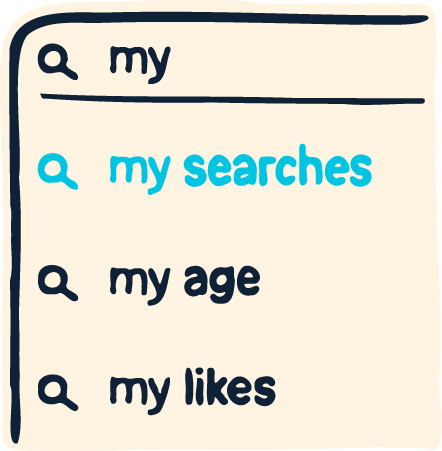And if we're not super comfortable with having that level of creepiness in our lives? Here's what we can do to stop those ads in our tracks

Transcript
Davis: Hi again, David. Let’s chat about the tools and technology that we can use to stop ads from tracking us. I know there are different techniques we can employ across our various devices and services that we use and I wonder if we can start with what we can do to stop our browsers from tracking us?
David: So luckily a number of solutions are available for blocking some tracking in web browsers. Privacy Badger, for example, is a browser extension for Firefox and Chrome that blocks a lot of known ad tracking. Facebook also does a lot of its own tracking tied to your Facebook account and its data, and a browser extension called Facebook Container can help to keep Facebook out of your non-Facebook web visits. Browsers on smartphones don’t support browser extensions though, but some mobile browsers like Brave and DuckDuckGo‘s web browser for iOS and Android both help block a lot of ad tracking.
I recommend checking each app you have installed on your phone to see if you can turn location services off.
Davis: Thank you. I know you set a lot of different tools there so if you’re watching please know that you can scroll down on the web page for NYC Digital Safety and find a list of all these tools. So let’s talk about our phones. I know location data is a very big deal in the tech world. How can we stop our location data from being shared so much?
David: Both iOS and android have ways of selectively letting us choose whether apps have permission to our location and when. I recommend checking each app you have installed on your phone to see if you can turn location services off for it, or at least turn it off, you know, for when you’re not using the app. Some apps might not work without location services, but you’d actually be surprised to see how many actually still do
Davis: We know that social media uses our personal data to fund their services as well. We’ve talked about that a lot so far. What can we do about that?
David: Social media sites like Facebook use data to create very targeted options for ad placement buyers. Contrary to popular belief, it doesn’t sell your data in the way people think it does. It doesn’t package up a giant pile of information then slap a price tag on it. Instead it creates an incredibly targeted ad network that lets companies show their wares to segments of users that have similar likes, demographics, behavior patterns, and interests and as you. The more data they have on you, the more precise the ads are getting and the more they can charge for that ad.
Different search engines will offer different levels of control to mitigate ad tracking.
Davis: Yeah, and I think that’s a great point, and one that bears repeating, is that Facebook and other companies don’t actually sell your data to other people but they sell access to you through their services, so that’s what sort of makes the ad industry go on social media.
So let’s talk search engines. Those are another vector for collecting data that can be used for targeted ads. What can we do to limit the amount of data search engines see?
David: Different search engines will offer different levels of control to mitigate ad tracking. For Google specifically you can turn off most of its ad tracking personalization in the ad settings page and you can also see kind of the categories of interests and other things that it’s inferred about you on the same page. Other search engines like DuckDuckGo and Startpage just don’t do ad tracking at all so there’s nothing to switch off there.
Davis: Thank you for all these tips. In our next video we’ll cover what to do with all the data that’s already out there. It’s been since the 90s that all this information has been available about us online so episode four will cover what do we do if our information is already out. So thanks so much, David, and I’ll see you in the next video.
Further Reading
DuckDuckGo
Downloadable browser extensions, search engine, and privacy browser app.Brave
Privacy-focused web browser.Privacy Badger
A browser extension that automatically learns to block invisible trackers from the Electronic Frontier Foundation.Facebook Container
An extension for Firefox helps you take control and isolate your web activity from Facebook.Startpage
A way to search and browse online without personal data collection, tracking, or targeting.How to Turn Off Location Services and Stop Your iPhone Apps From Tracking You
A guide for how to control what Apple and app makers know about your whereabouts.Protect Your Privacy From the Apps on Your Phone
A guide to protecting your privacy on both iPhones and Android phonesHow Facebook Shapes Your Feed
A report on how Facebook's algorithm works to populate your feed, and the way it handles your data
Relevant Terms
Browser Extension
A small software module for customizing a web browser.
Location Data
Geographical information about a specific device's whereabouts that's associated with a specific date and time.
Contributor Bios
- Davis Erin Anderson is Director of Programs and Partnerships at METRO Library Council.
- David Huerta is a Digital Security Trainer at Freedom of the Press Foundation, where he trains journalists in privacy-enhancing technology to empower a free press. He’s taught hundreds of trainings across the world and has previously organized the digital security track at the National Association of Hispanic Journalists (NAHJ) conference. He’s also spoken on the subject of usable privacy technology at DEF CON, Radical Networks, Rightscon, Facets, Allied Media Conference and anywhere the words "use PGP" summon him to a stump speech.
- This project is funded by the Mayor’s Office of the Chief Technology Officer, and produced in collaboration with Brooklyn Public Library, The New York Public Library, and Queens Public Library.

